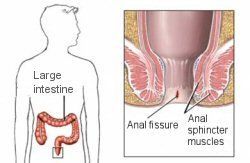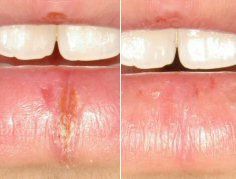Anal Fissures
Anal Fissures
The symptoms of anal fissure can be relieved by wheatgrass which, although you may not know it, has quite remarkable pain-relieving and healing properties.
You may not need to change your diet, drink gallons of water, use stool softeners or load your bowel with fibre. You may also be relieved of the pain and bleeding that can be so distressing in this condition.
Surgery, like botox injections and other expensive procedures should only be considered as a last resort.
Anal fissure – What is it?
As shown in Figure 1, a fissure is a split or tear at the outer end of the anal canal wall, usually at the posterior or back side of the anus. In chronic fissures, a skin tag known as a ‘sentinel pile’ often overlies the fissure and can be mistaken for a painful hemorrhoid.
Case Study: 28 yr. Old Lady

Fig. 1 – Anal Fissure
The power of Wheatgrass Healing
Although it affects a different part of the body, anal fissure results from a breakdown in the anal wall very much like the split lip shown in Figure 2 which, as many of us know, can also be very painful and difficult to treat. This young male patient suffered for more than a year and received numerous treatments including antibiotics, steroids and anti-fungals that didn’t work. His wound however healed in one week after only one application of wheatgrass cream. Why? Most likely because of Growth Factor activation by one or more bioactives in wheatgrass. (See final paragraph for more information)

Fig. 2 – Before & After
See more Power of Wheatgrass Healing
What are the symptoms of anal fissure?
Typical symptoms may be:
- Pain, which can be severe, during and after bowel movements
- Red blood in the stool (blood on the toilet paper)
- Constipation – due to pain causing avoidance of passing stool
- Anal itchiness, burning
- Difficulty in passing urine
Common Questions
Why is there so much pain?
The area where anal fissure occurs is supplied by numerous nerve endings that are highly sensitive. Even a tiny split in the wall of the anal canal can be very painful, particularly during a bowel motion when the anal muscles are stretched.
Who else gets anal fissure?
Anal fissure is very common. It is estimated that approximately 250,000 new cases occur each year in the US alone. It can occur in newborns and right across the age spectrum to old age, and affects both sexes equally. It is most common from young adulthood to middle age. Pregnancy and childbirth can aggravate or initiate the condition.
How long does it last?
Approximately 50-60% of anal fissures will heal spontaneously. However it can recur or become chronic (sometimes lasting for years) in the other 40-50%.
How is anal fissure diagnosed?
My method is simple. I use a wheatgrass extract in a cream base and get the patient to apply a small amount just inside the anal opening twice daily with a cotton bud. In greater than 80 percent of cases, the symptoms disappear, usually within four to six weeks, sometimes within a few days.
Because the fissure itself is not a life-threatening condition, it is not essential to heal the fissure although most of them do heal in time. The aim should always be to rid patients of their symptoms so they can resume a normal quality of life – something that wheatgrass is very good at.
What causes anal fissure?
Doctors invoke all kinds of reasons why fissures develop including constipation, hard bowel motions, diarrhea, inflammation, reduced blood flow to the anal region, poor bowel habit and even ‘spiky’ foods such as peanuts. They seem to forget that many fissure patients do not have constipation, (some in fact have diarrhea) and some babies are born with fissures. It is unlikely the cause is related to trauma unless there is some direct injury to the anal wall e.g. from colonoscopy or childbirth.
More likely, the fissure occurs first and the constipation follows. In other words, constipation is an effect and an aggravating factor, not a cause of anal fissure. How do I know this?
The answer is based on simple clinical observation of numerous patients with chronic constipation. Many of them had undiagnosed chronic anal fissures that were missed because examination of the anal canal had never been performed. However, when their pain symptoms were relieved following treatment with wheatgrass, their constipation disappeared.
This suggests there must be some other process causing the fissure(s). I believe one contributing factor is auto-immunity.
What does auto-immunity mean?
Normally the immune antibodies our bodies produce act to stave off bacteria, viruses and other organisms that try to invade the body, and to kill off cancer cells that continually develop inside us. When this system goes awry, such as when the body undergoes severe or prolonged emotional or physical stress or severe illness, these antibodies can attack and damage healthy cells, tissues or organs. This is called an auto-immune reaction which can eventually cause an auto-immune condition if it continues long enough. In rheumatoid arthritis for example, joints can become severely damaged. i.e. they become red, swollen and painful and eventually lose their function.
My theory is that this is what occurs in anal fissure and possibly in other similar painful conditions such as tennis elbow and plantar fasciitis and perhaps even in the split lip shown in Figure 2. For some reason, these antibodies attack the mucous membrane on the anal wall. This breaks down and the fissure opens up. At time of passing stool, the anal muscles reflexly go into spasm and the bare nerve endings in the fissure produce a painful sensation. The pain leads to stool avoidance which can then cause constipation which aggravates the fissure and the whole process becomes cyclical.
Unless some way is found to heal the fissure, or the body repairs itself, the fissure becomes chronic. The anal verge being unable to “rest” for any length of time because of the need for bowel evacuation, the fissure remains open.
So the aim should be to fix the fissure, not the constipation. However, this has never been an easy task – until now.
How does wheatgrass work for anal fissure?
Having used wheatgrass on thousands of patients for a variety of conditions it has been strikingly obvious to me that it facilitates natural healing e.g. for wounds, burns, fractures, anal fissure etc. (See Fig. 2.) One can actually see the healing in progress for example in burns and infected wounds when the open wound re-covers with a thin film of new cells in 24-48 hours. This keeps the exudate that contains growth factors necessary for healin – in, and the bacteria out. Often the patient’s pain disappears as well. These are not phenomena one sees when the body is healing itself unaided.
It is well known that hormones produced by the body called Growth Factors are an essential and very important part of the healing process, and for reducing inflammation. It appears that wheatgrass in some way stimulates the production of these important growth factors that ‘normalize’ damaged tissue and facilitate rapid healing. Wheatgrass can also work very well for some auto-immune related disorders such as acne rosacea and psoriasis. In other words, wheatgrass is a potent, natural healing agent.
